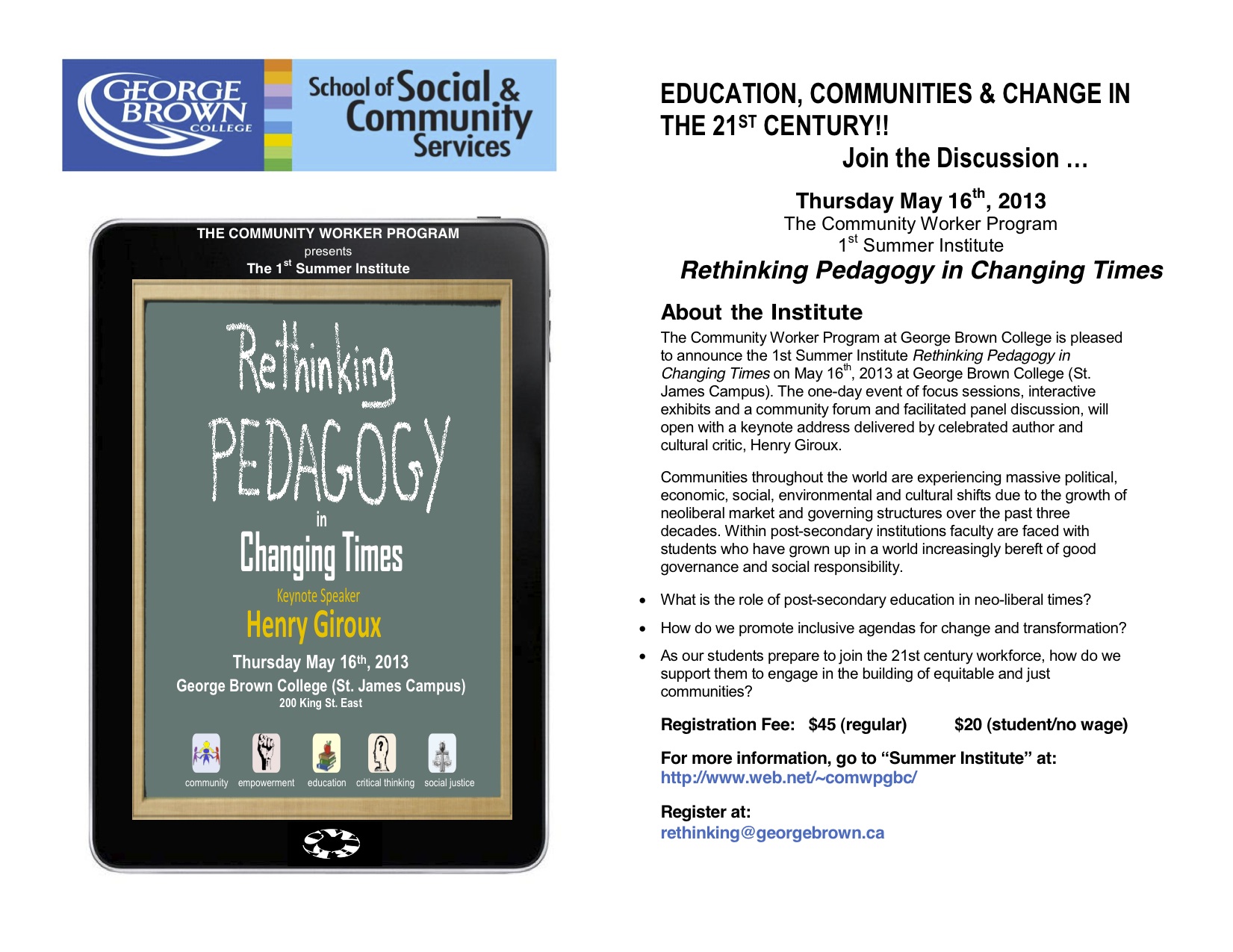Professor Henry Giroux, one of North America’s most famous theorists, will be speaking at a conference on “Rethinking Pedagogy” at George Brown College on Thursday, May 16. The conference is being organized by the College’s Community Worker Program. The latter is dedicated to training students to become community organizers, group facilitators, popular educators, program managers and advocates. As well, the department includes an invaluable international study option in Cuba or Jamaica. The program has been in operation since 1975 and any progressive who has worked with a variety of community agencies in Toronto will know more than one person who has graduated from this remarkable course of study. The program’s student population provides the educator with the most diverse classroom in the world, not only in terms of ethnicity, gender, sexuality and class but also in terms of age, ability and learning style. Full disclosure: I learned how to teach by being a full-time professor for Community Worker for three years in the late 1990s. The two-year program’s course of study is implicitly informed by what Giroux would call a critical pedagogy.
Giroux was named by Routledge, in 2002, as one of the 50 most important educational thinkers of the modern era. He has taught at Boston University, Penn State, and now at McMaster University. He is one of the key figures in the development of critical pedagogy; that is, a theory of education that emphasizes the moral and political development of the student with the aim of creating a more radically democratic society.
Giroux has noted that the difference between the past generation’s right-wing and left-wing theories of pedagogy is that the former has criticized public educational institutions for not doing enough to train students to fulfill the cultural and practical requirements of the market economy while the latter has advanced the exact opposite claim. Progressives have historically argued that schools, like most other institutions in society, have become institutes for training students to reproduce capitalist skills, social relations and rationality.
Giroux, along with his well-known predecessor, Paulo Freire, shifted the left-wing focus from reproduction to production and articulation; that is, studying how individuals and groups imagine, interpret and reshape their experience of various forms of domination. Giroux was one of the first pedagogues to theorize that power should be understood not simply via the idea of class but instead via the notion of difference: domination took numerous contradictory forms in terms of identity, history and location and therefore has entailed diverse modes of collective interpretation, resistance and mobilization. Contemporary educators’ sensitivity to the various ways in which diverse identities shape the student’s experience is informed by the work of Giroux and other theorists of critical pedagogy.
The great analyst’s empathy for the marginalized never clouded his understanding of the subjective aspect of power. While Giroux would be the first to point out the role of the state and corporations in influencing the student’s interpretation of the world, he has also always recognized how domination is internalized. Power is both an objective and subjective process. Human beings learn to contribute to their own subordination: students will actively resist knowledge so therefore one of the tasks of the teacher is to reflect on the internal psychic mechanisms and external power relations that encourage the student to ignore, forget or ward off information that could aid them.
Giroux’s talk on May 16 is a critical one for present and future teachers. In the past, progressives fought conservatives in terms of the content of education. Today the debate has moved so far rightward that educators, before even focusing on content, have to struggle against conservatives and liberals for their rights as employees. Giroux’s critical analysis of pedagogy will aid us in re-defining the fate of education for both students and teachers.
Thomas Ponniah is an Affiliate of the David Rockefeller Center for Latin America Studies and an Associate of the Department of African and African-American Studies at Harvard University.



